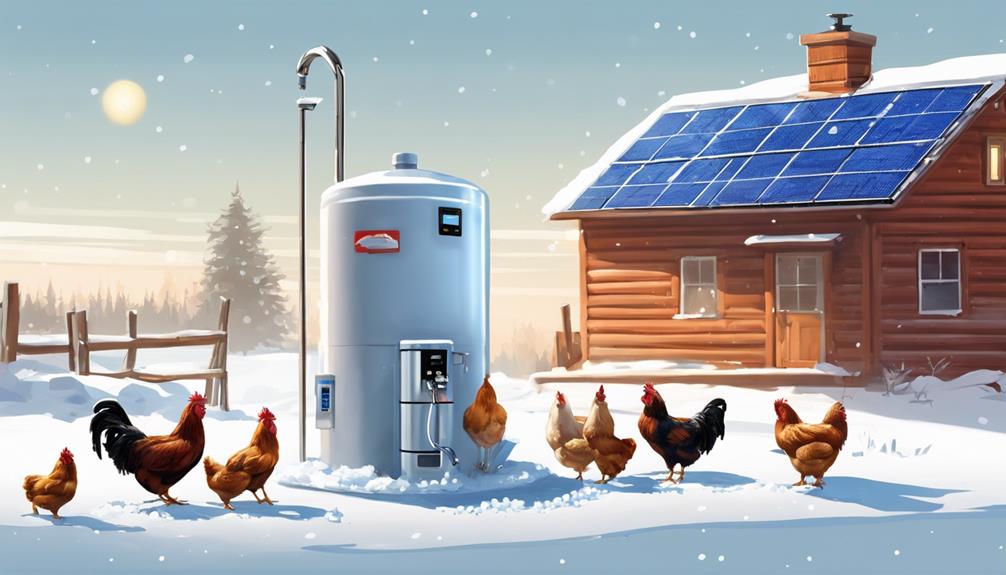You might not realize it, but the cold winter months can be as challenging for your backyard chickens as they are for you. Adjusting their diet is critical to keeping them healthy and warm.
By increasing their protein intake, offering warming treats, and ensuring they have access to fresh, unfrozen water, you're setting them up for a comfortable winter. However, there's more to it than just these steps. Understanding the nuances of each can make a significant difference in how well your chickens fare during the colder season.
Let's explore how you can implement these changes effectively, ensuring your feathered friends not only survive but thrive.
Key Takeaways
- Increase protein intake using mealworms, meat scraps, or commercial feeds to support health and feather growth.
- Serve warm treats like cooked grains or scrambled eggs in the evening for energy and warmth.
- Ensure constant access to unfrozen water using electric dog bowls to aid digestion and prevent dehydration.
- Insulate and ventilate the chicken coop to maintain a warm, dry environment throughout the winter.
Adjust Protein Intake
As winter approaches, it's crucial to adjust your backyard chickens' protein intake to maintain their health and egg production. During the colder months, your feathery friends require additional protein not just for warmth but also to support muscle growth and aid in feather development. This is where incorporating protein supplements, such as mealworms, meat scraps, and specially formulated commercial feeds, becomes beneficial.
Increasing the protein levels in their diet helps them effectively combat the cold weather, ensuring they remain active and healthy. It's essential to provide a balanced diet that meets their increased protein needs. This adjustment isn't just about adding more food but ensuring the right kind of nutrients are included to support their well-being during the winter.
Monitoring your chickens' protein intake is key. Pay close attention to their condition, egg production, and behavior as these signals can help you determine if further adjustments are necessary. Remember, every flock is different, and factors like breed, age, and the specific environmental conditions of your area can influence their dietary requirements. By keeping a watchful eye and making necessary adjustments, you'll ensure your backyard chickens thrive throughout the winter season.
Offer Warm Treats
Offering warm treats to your backyard chickens can significantly enhance their comfort and warmth during the cold winter months. Warm treats like cooked grains, oatmeal, or scrambled eggs not only provide your chickens with additional warmth but also boost their energy levels. It's especially beneficial to serve these warm treats in the evening as they can help chickens maintain body heat throughout the chilly night, ensuring they stay cozy and comfortable.
Incorporating warm treats such as cooked vegetables or soups into your chickens' winter feeding routine can be a nutritious and comforting option for them. These treats aren't just about the warmth they provide; they're also about giving your backyard flock a variety of foods that can help them stay healthy during the winter. However, it's crucial to ensure that the treats aren't too hot to avoid burning their mouths or throats.
Maintain Water Access

While ensuring your backyard chickens enjoy warm treats is crucial for their winter comfort, it's equally important to maintain constant access to unfrozen water. Chickens need fresh water for digestion, efficient egg production, and to stay healthy. Without it, they risk dehydration, decreased egg production, and other health issues. Plus, being well-hydrated helps chickens regulate their body temperature during the colder months.
To keep your chickens' water intake steady and ensure they're adequately hydrated, consider:
- Using an electric dog water bowl to keep water from freezing. This simple tool can be a game-changer in maintaining access to unfrozen water.
- Monitoring water levels frequently, as chickens need continuous access to water to avoid dehydration and its related risks.
- Placing water sources strategically to encourage regular water intake. Make sure they're easily accessible, protected from the elements, and not prone to freezing.
Conclusion
In conclusion, keeping your backyard chickens healthy during winter doesn't have to be a daunting task. Just remember to adjust their protein intake, offer warm treats like scratch grains or suet, and ensure they've got constant access to fresh, unfrozen water.
These simple steps will help your feathered friends stay cozy, energized, and hydrated throughout the chilly months. By following these essential tips, you're setting your chickens up for a thriving and productive winter season.